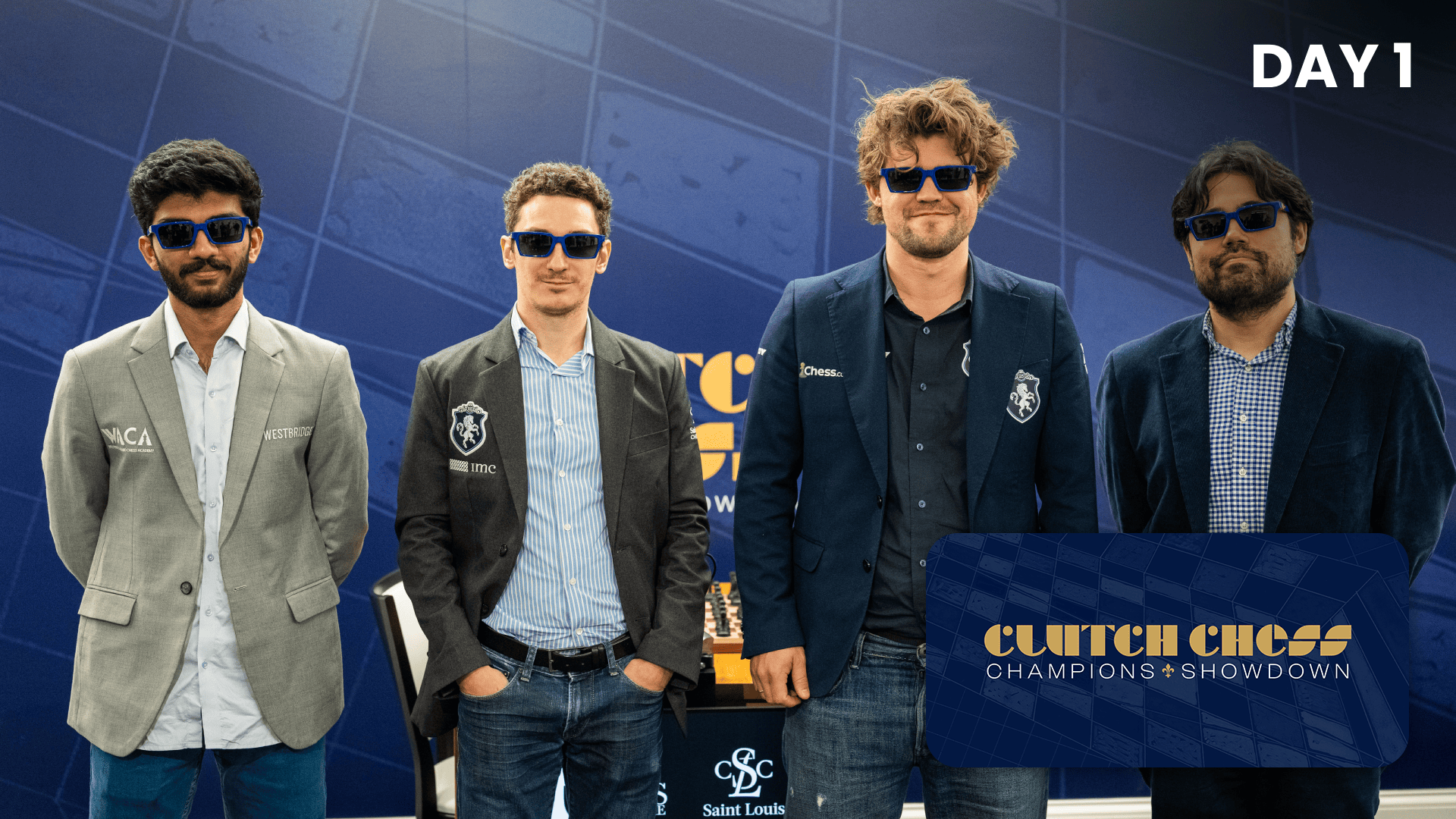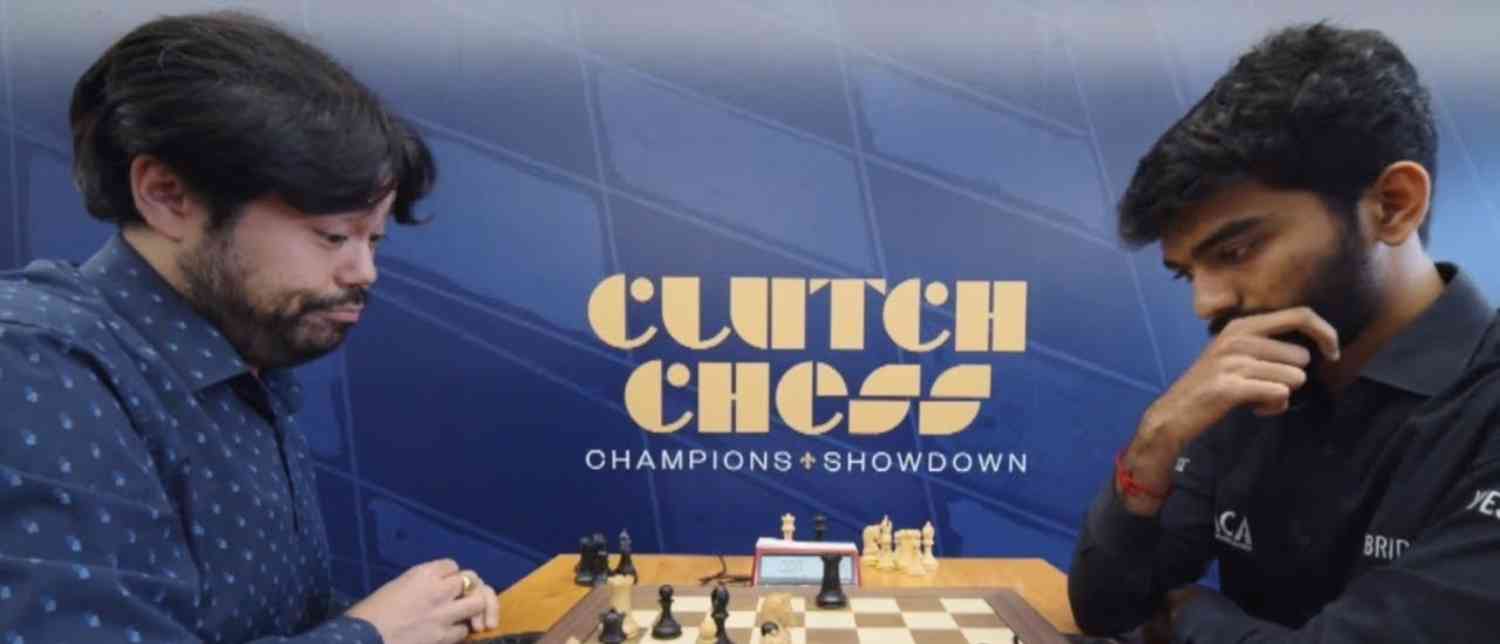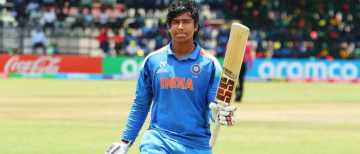World Chess Champion D. Gukesh once again proved why he is one of the brightest stars in the modern chess world — and one of its most composed. In a much-awaited rematch at the Clutch Chess Champions Showdown 2025 in Saint Louis, the 19-year-old Indian Grandmaster defeated American Grandmaster Hikaru Nakamura in a rapid mini-match that had fans across the globe watching every move.
But what made this encounter special wasn’t just Gukesh’s victory — it was how he won. Calm, calculated, and unshaken, Gukesh turned the emotional weight of their past rivalry into quiet triumph, taking what many fans have called “the most graceful revenge in chess.”

A Calm Conqueror: Gukesh’s Silent Statement
Gukesh’s Round 2, Game 1 win with the Black pieces was a masterclass in restraint and technical mastery. Against an opponent known for his bold style and psychological tactics, the Indian prodigy chose patience and precision.
Throughout the game, Gukesh displayed mature decision-making — navigating a complicated middle game, maintaining balance under pressure, and steering the board toward an impeccable endgame. His methodical play left Nakamura visibly short on options.
When the moment came, the American Grandmaster extended his hand in resignation. But instead of celebrating or showing emotion, Gukesh simply reset the pieces on the board and left with a quiet expression. No fist pump. No smile. Just the grace of a true champion who lets his moves speak for themselves.
Observers noted that this calm reaction carried far deeper meaning — it was a symbolic answer to an incident that had sparked controversy just weeks earlier.
The Backdrop: When Hikaru Tossed Gukesh’s King
The tension between Gukesh and Nakamura had been brewing since the Checkmate: USA vs India exhibition event, where Hikaru Nakamura’s actions drew widespread criticism.
After defeating Gukesh in that match, Nakamura dramatically threw Gukesh’s king into the audience — an act that divided the chess world. While some viewers brushed it off as showmanship meant to entertain fans, others considered it disrespectful to both Gukesh and the traditions of chess.
The moment went viral on social media, with fans and commentators debating whether the flamboyant gesture crossed the line between sports entertainment and poor sportsmanship.
Against that backdrop, their rematch at the Clutch Chess Champions Showdown 2025 carried undertones of rivalry, revenge, and redemption. But when the time came, it was Gukesh’s silence that spoke the loudest.
Check out the final moments of Gukesh beating Hikaru Nakamura with the Black pieces at Champions Showdown! pic.twitter.com/RqgW6WtCZ9— ChessBase India (@ChessbaseIndia) October 27, 2025
The Revenge of Restraint
This time, Gukesh didn’t just defeat Nakamura — he outclassed him, both on and off the board. His composure was seen as a quiet rebuke to Nakamura’s earlier theatrics.
As Hikaru extended his hand, Gukesh met it with respect and then calmly reset the board. That small, simple gesture became one of the most talked-about moments of the event — a masterstroke of dignity in a game that often sees psychological drama.
Social media erupted with praise. Fans hailed Gukesh’s “silent revenge” and “kingly composure”, contrasting his behaviour with Nakamura’s earlier antics. One fan wrote, “He didn’t throw the king. He became one.”
Even Nakamura seemed to acknowledge the difference. After the match, he congratulated Gukesh and later admitted that the young World Champion had shown immense maturity and focus under pressure — qualities that set him apart from many peers his age.
A Strategic Masterclass
From a technical standpoint, Gukesh’s victory was a lesson in endgame clarity. Facing one of the fastest and most creative players in the world, he resisted the urge to match speed with speed. Instead, he slowed the game down, forcing Hikaru into deep positional waters.
Every move reflected balance — never rushed, never forced. His ability to stay patient in a complex position and transition smoothly into a winning endgame underlines how much he has grown since becoming World Chess Champion earlier in 2025.
Analysts noted that Gukesh’s game showed a new level of maturity — one that blends Anand-like composure with Carlsen-level precision. He seems to be developing a distinct identity: a player who blends classical calm with modern tactical flexibility.
Somehow this makes me feel so satisfied. Kudos to Gukesh for beating Hikaru and behaving unlike Hikaru. And shame on sepoys who try to apologize for and normalize unruly, uncouth behavior because your western master said "this is the new norm, we say so."pic.twitter.com/vwGfuQXKMu— Aravind (@aravind) October 28, 2025
Officials and Fans Celebrate a Mature Champion
The All India Chess Federation (AICF) praised Gukesh’s sportsmanship and focus. In a statement, officials noted that his calm demeanour “reflects the true spirit of Indian chess — disciplined, thoughtful, and deeply respectful of the game.”
Chess fans across India and around the world celebrated the win as more than just a point on the leaderboard. To many, it was a defining moment in the narrative of a young world champion who continues to carry himself with humility despite global fame.
Online reactions poured in from grandmasters, commentators, and fans alike. Chess streamers highlighted how Gukesh’s reaction embodied “quiet confidence,” while others said his composure was “the best checkmate to arrogance.”
Building on India’s Golden Chess Legacy
Gukesh’s rise is not just a personal story — it represents the growing dominance of Indian chess on the global stage. Following the legendary Viswanathan Anand, India has seen a surge of prodigies: R Praggnanandhaa, Arjun Erigaisi, and Nihal Sarin, all of whom have made waves in international tournaments.
As the youngest World Champion in chess history, Gukesh is both the product and the torchbearer of this revolution. His disciplined approach and steady temperament are reminiscent of Anand’s grace and humility — qualities that define India’s chess culture.
At the Clutch Chess Showdown 2025, Gukesh also impressed beyond the Nakamura match, securing multiple wins and draws against world leaders such as Magnus Carlsen and Fabiano Caruana. Analysts say this consistency signals that his reign is no accident — it’s the beginning of a new era for Indian chess.
So happy for Gukesh, Much needed comeback!pic.twitter.com/ez9fHmWvo9— The Khel India (@TheKhelIndia) October 28, 2025
The Clash of Temperaments
The contrast between Gukesh and Nakamura couldn’t have been clearer. Nakamura, known for his expressive style and showmanship, thrives on intensity and audience engagement. Gukesh, on the other hand, is quiet and introspective, focusing purely on the craft.
Their differing temperaments created a compelling narrative: one that extended beyond the board. While Hikaru’s earlier theatrics drew criticism, his gracious acknowledgment of Gukesh’s victory in Saint Louis helped ease tensions between their fanbases.
The moment showed that even in fierce rivalry, respect and maturity can prevail — and that sometimes, the loudest message is the one delivered in silence.
Public Reaction: A Lesson in Sportsmanship
On social media, the public reaction to Gukesh’s win was overwhelmingly positive. Fans across platforms described his behaviour as “true sportsmanship” and “a masterclass in grace under pressure.”
Memes, fan art, and thoughtful commentary flooded X (formerly Twitter) and Reddit, celebrating the teenager who let his chessboard do the talking. Some playful fans suggested Gukesh should have “thrown Nakamura’s king into the crowd” to return the gesture — but most agreed his calm response was far more powerful.
Grandmaster commentators praised his psychological maturity, calling it “the hallmark of champions.” Others drew parallels with legends like Anand, noting that Gukesh’s quiet confidence mirrors the dignity that has long defined India’s greatest chess ambassadors.
THE WORLD CHAMPION GUKESH IS BACK! 💥 pic.twitter.com/EeQ6GwlAcK— The Khel India (@TheKhelIndia) October 27, 2025
Beyond the Board: A Symbol of Character
Gukesh’s victory was more than a sporting achievement — it was a statement on character, humility, and the enduring spirit of chess. In an era where competitive tension often spills into drama, his restraint reminded fans what true mastery looks like.
It takes courage to win. But it takes far greater strength to win with dignity. Gukesh showed both. His performance reflected not only technical brilliance but emotional intelligence — the ability to rise above controversy and let results speak louder than reactions.
As one commentator aptly put it: “Gukesh didn’t just defeat Nakamura. He defeated ego, emotion, and expectation — with silence as his weapon.”
A Message for the Future
The story of Gukesh vs Hikaru Nakamura at the Clutch Chess Champions Showdown 2025 will be remembered not just for its moves but for its meaning. It serves as a reminder that chess, at its heart, is a game of intellect, patience, and respect — values that transcend victories and trophies.
Gukesh’s calm triumph offers an inspiring message for young players worldwide: that grace under pressure and humility in success are the true hallmarks of greatness.
As Indian chess continues its golden march forward, one thing is certain — D. Gukesh isn’t just rewriting records; he’s redefining what it means to be a champion.
With inputs from agencies
Image Source: Multiple agencies
© Copyright 2025. All Rights Reserved. Powered by Vygr Media.






















